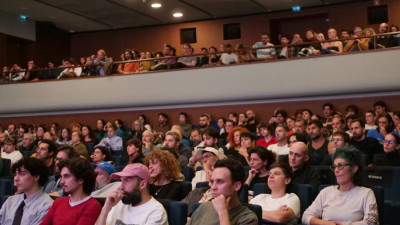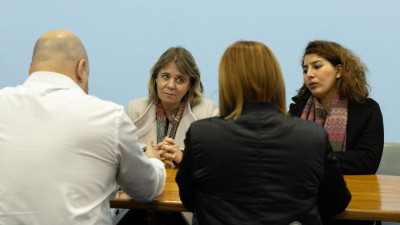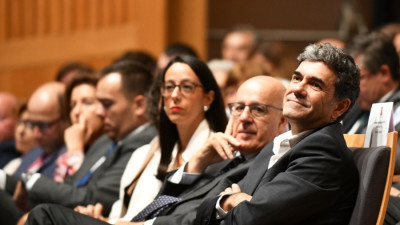In this already long pandemic year, the European left has attempted to articulate intervention and share information. We are experiencing the crisis in different ways, with diverse instruments and amid different political frameworks. Some of the parties that constitute the Party of the European Left have governmental responsibilities, others are in opposition to centre and right-wing governments or even oppose governments supported by extreme right-wing forces. The strength with which the pandemic plagues our countries is different in its various waves, both in its health and socioeconomic impact, as well as in its public policy priorities. Some countries have opted for more prolonged or more severe confinement measures, whilst others have tried to maintain normality as possible; in almost all of them, there is a combination of confinement and openness in the wake of pandemic waves. The instruments at the disposal of governments to respond to the pandemic are also different: the universality or not of health services, the levels of social and labour protection, articulation between public services, the ability of States to impose rules on the economy, the existence or not of various decision levels (state, regional, local). But with all these differences, there are transversal realities that can be the core of a common intervention.
Essential workers without essential rights?
Women are the majority in care tasks. They are the majority of workers in the health and care sectors and their wages are below average, working hours are unusually long, and precarious labour relationships are common. They are also the majority in sectors such as cleaning, where low wages and precariousness are the norm. In addition to the (poorly) paid work in care and cleaning, they also accumulate unpaid care and cleaning work in the realm of their own family. They thus accumulate a double burden in confinement: it is essential workers who cannot stop, and it is family caregivers who are left behind when social facilities are closed (schools, services dedicated to people with disabilities or the elderly). In addition to this double burden there is a third one: sexist violence, which is hidden inside home.
The essential sectors, which can never cease to function, reveal another inequality: the disproportionate prevalence of migrant workers and racialised minorities. It is so with care and cleaning tasks, in agriculture or in distribution. Low-paid workers, very precarious labour relationships and very often without access to social protection. Without the capacity to assert their rights, they are subjected to housing, transport and work conditions that endanger their health. Once sick, they do not even have access to social benefits that support them when losing their wages.
The central struggle of the left continues to be directed towards the rights of those who work. The pandemic crisis reveals in all its rawness the violence of the liberalised “labour market”; precarious people have no social protection and are abandoned in illness as well as in unemployment. And, as shown by the inequalities that the pandemic has only worsened, the left is obliged to a feminist and anti-racist perspective in this struggle. Any ompromise or forgetfulness in this field will create more social division and put at risk any advance.
The strength and fragility of public services under the crisis pressure
Whilst private hospitals accounted for the price of each day of Covid-19 hospitalisation and private insurances informed the world that their policies do not cover pandemics, public health services were already receiving patients and reorganising their services. Public health services were able to provide a comprehensive response from the very beginning. They could not wait to find out more about the disease to start responding to the population and the culture of their workers allowed for very rapid adaptations in exceedingly difficult contexts. The same happened with schools and universities and research centres. Public services were the first to respond to the pandemic, to adapt their intervention. Tasks as diverse as accompanying students at a distance or making reagents for Covid-19 tests were implemented in a few days. Public services geared to responding to the population were and are the key in responding to the pandemic.
After years of liberal orthodoxy, European Union countries are faced with the fragility of their public services. As the crisis proved, the market did not create virtuous alternatives to meet the needs of the population. On the contrary, it awaits the collapse of public services under the pressure of the pandemic, and already weakened by years of underfunding and staff cuts, to impose the privatisation and financialization of what remains of the European Welfare State.
In a scenario of prolonged crisis, such as the one we are experiencing, the bankruptcy of public services is a real danger and one that drags its own popular delegitimation; in this scenario, the same public services that are the support of the population in crisis, can be seen as guilty in the absence of this support. The protection and reconstruction of public services is the immediate great collective task in the defence of democracy.
European treaties undermine European cooperation
In the European discourse, there seems to be a consensus on the response to the crisis: investment in health and social protection, cooperation between countries, supporting the economy to guarantee employment and facilitate recovery, placing new environmental demands on public investment. This discourse comes up against inconsistencies, deadlocks, and even setbacks in the decisions that are being made.

“Quistioni” the new magazine of the European Left
If cooperation on vaccination has certainly been an essential step, it is no less certain that the contracts made have placed the European Union in the hands of pharmaceutical companies. The same ones that received millions of public investment, and whose advances have also depended on research financed by the States for decades, are now bargaining for the vaccines they promised. We shall see how the next few days unfold and if the sad competition that we saw in the early days of the pandemic (at the time, for ventilators and personal protective equipment) does not come back. The vaccine must be treated as a common good; public control of its distribution and payment at cost price (focused on guaranteeing its production and not on the profit of pharmaceutical companies) are essential for universalising access to the vaccine. It would be interesting, but absolutely unlikely in the current political framework, to have an articulation that allowed States to overcome patents and rapidly increase vaccine production.
In the field of economic policy, the contradictions and difficulties are even greater. At the outset, it is not yet certain how the Recovery Facility will work. But it is already certain that, in order to respond to the crisis, suspending the treaties was a necessary step. For the second time, the European Union recognises that its treaties are a problem and not a solution. In fact, the question is as simple as this: European treaties criminalise public investment and aggravate any crisis.
The central problem is to know whether it is enough to suspend treaties and experience has proved, even to those who are most optimistic, that this is not possible. First and foremost, because the decision to bring back the treaty rules is always determined by the strongest economies. It was like that in the financial crisis, and it is already stated that it will also be like that with the pandemic crisis. As soon as the German economy allows it, barriers to public spending will return. By then, countries on the periphery of the euro will be even further away from any recovery than they were when the troika was created. Temporarily suspending the treaties is a trap and a soon-to-be condemnation for the peoples of those countries, but also for the European Union itself, whose breakdown will continue to take place.
Above all, the European treaties deny the proclaimed new great European plan: combating climate change. Without investment and the capacity for public intervention in the energy transition and decarbonisation of the economy, there will be no answer to the climate crisis. And if we have no reason to believe the European Commission’s conviction in this fight (after all, who else would remember to hire BlackRock, an investment fund with interests in fossil fuels, for conducting environmental impact studies?), this is the struggle of our lives. The left must assert that the response to the climate crisis, as well as the response to the pandemic crisis, requires European and international collaboration. What is clear is that the European treaties are the first obstacle to such cooperation. Proposing the replacement of unviable treaties is not giving up European cooperation; it is, on the contrary, a fundamental step in its construction.
Catarina Martins is the coordinator of the Bloco de Esquerda. A member of the Portuguese Parliament, she is a political activist for cultural movements and various struggles of precarious workers. “Quistioni” the new magazine of the European Left








